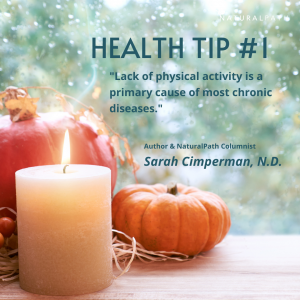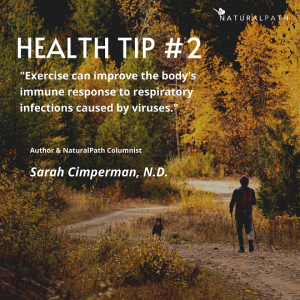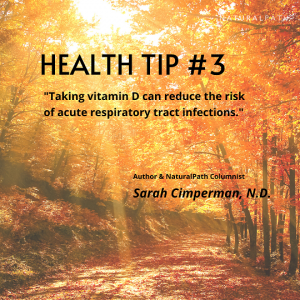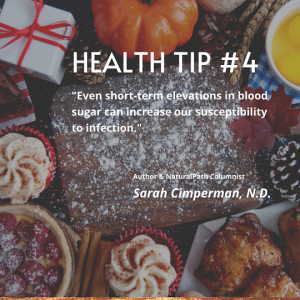
As the seasons change, so do our bodies. Now that autumn is settling in, days are becoming shorter, nights are becoming longer, and temperatures are becoming cooler. While our internal clocks adjust to the seasonal transition, we may experience changes in sleep, mood, metabolism, and immunity. We’re more likely to suffer from insomnia, depression, and anxiety, and we’re more likely to get sick. Preventing infections is always a priority during cold and flu season, but it’s especially important during the current COVID-19 pandemic. This year, head into fall with some healthy habits that will help keep you well. Here are seven ways to get started.
#1 | Get a COVID-19 vaccine.
The coronavirus vaccines aren’t right for everyone, like individuals with allergies to vaccine components and anyone who is acutely ill. But for most people, the benefits outweigh the risks. Like other immunizations, COVID-19 vaccines may have short-term side effects like fatigue, headache, and fever. But aside from these, adverse reactions associated with the vaccines have been both less common and less severe than the symptoms and complications associated with COVID-19 infection. A recent report from the Centers for Disease Control and Prevention found that in comparison to people who are fully vaccinated, individuals who are unvaccinated are five times more likely to become infected with the coronavirus, ten times more likely to be hospitalized for COVID-19, and eleven times more likely to die.1
#2 | Exercise outside.

Lack of physical activity has been recognized as a primary cause of most chronic diseases2 and regular exercise is a proven strategy for preventing chronic diseases like obesity, cardiovascular disease, diabetes, hypertension, depression, osteoporosis, and cancer, as well as premature death.3 While exercise alone is good, exercise outdoors is even better, especially during seasonal transitions. Studies show that regular physical activity can help restore dysregulated circadian rhythms,4 improve the body’s immune response to respiratory infections caused by viruses,5 and improve outcomes when people do get sick.5 A good goal for most people is two and a half hours of aerobic and strengthening activities per week, plus stretching after exercise. Anyone with health concerns should get permission and individualized recommendations from their doctor.
#3 | Consider a vitamin D supplement.

Vitamin D is a key nutrient used all over the body but it’s especially important for the immune system. Our skin makes vitamin D upon exposure to sunlight. Production dips during colder months when there is less sunlight, the sun’s ray are less intense, and we cover up our skin to stay warm. Exercising outdoors will ensure some amount of vitamin D production, but it may not be enough. People with low levels of vitamin D can benefit from taking a supplement in addition to spending time outdoors. A review of twenty-five randomized controlled trials involving more than ten thousand people found that taking vitamin D supplements reduced the risk of acute respiratory tract infections in all participants.6 Talk to your naturopathic doctor about the right dosage for you and be sure to take vitamin D with meals for optimal absorption.
#4 | Eat seasonal vegetables.
Vegetables are good sources of many things our bodies need to stay healthy including vitamins, minerals, antioxidants, and fiber. Research studies show that a higher intake of vegetables and fruits has been associated with a lower risk of cardiovascular disease, cancer, and death from all causes.7 Seasonal fall vegetables include beets, broccoli, Brussels sprouts, cabbage, carrots, cauliflower, eggplant, kohlrabi, pumpkin, radishes, squashes like butternut and acorn, sweet potatoes, turnips, and dark green leafy vegetables like kale, chard, and spinach. Make them about half of every meal.
#5 | Go to bed earlier.
When the days are short and the nights are long, getting extra sleep when we’re tired is a natural adaption to our environment. Studies show that a full eight hours can help keep us healthy. In a trial published in The Archives of Internal Medicine, researchers studied people before and after exposure to a cold virus.8 They found that adults who slept less than seven hours were almost three times more likely to develop a cold compared to those who slept eight hours or more. 8 Sleep efficiency, the percentage of time spent asleep while in bed, made a difference as well. Participants who reported less than ninety-two percent efficiency were five and a half times as likely to come down with a cold compared to those whose efficiency was reported to be ninety-eight percent or above.8 For most people, getting eight hours of sleep every night is a good goal, especially during colder months. If you have difficulty falling asleep or you wake up during the night, improve your sleep efficiency by eliminating caffeine, avoiding the use of electronic devices two hours before bed, and sleeping in a cool, quiet, and completely dark environment.
#6| Avoid Halloween candy.

Eating too much sugar causes blood sugar levels to rise. Over time, high blood sugar increases the risk for chronic diseases—like type two diabetes, heart disease, and stroke—but even short-term elevations in blood sugar can significantly alter our immunity and increase our susceptibility to infection.9 This Halloween, skip the candy. Instead give trick-or-treaters something to encourage activity or creativity like finger puppets, yo-yos, small games, coloring books, colored pencils, or Halloween-themed stickers, notepads, or erasers. If you want to give out edibles, pick sturdy fresh fruit like apples or oranges, single servings of raw almonds, individually-wrapped string cheese, or 100% xylitol-sweetened gum. Xylitol is a naturally sweet compound originally extracted from birch trees but also found in the fiber of other plants like berries, mushrooms, and oats. Unlike other sweeteners, it’s been shown to prevent cavities and ear infections in children, and to reduce the need for antibiotics.10
#7 | Eat healthy proportions on Thanksgiving.
Thanksgiving meals are famously large, but they don’t have to be unhealthy. Choose to sample sweet and starchy foods in small portions to make room on your plate for vegetables and protein. Chew your food thoroughly and derive pleasure from savoring the flavor and texture of every bite, not from consuming a large amount of food. Finish your holiday meal feeling satiated rather than stuffed. After all, you can always look forward to leftovers.
References:
1 Centers for Disease Control and Prevention. Monitoring Incidence of COVID-19 Cases, Hospitalizations, and Deaths, by Vaccination Status — 13 U.S. Jurisdictions, April 4–July 17, 2021. Morbidity and Mortality Weekly Report . 2021:70(37);1284–1290. https://www.cdc.gov/mmwr/volumes/70/wr/mm7037e1.htm?s_cid=mm7037e1_whttps://www.cdc.gov/mmwr/volumes/70/wr/mm7037e1.htm?s_cid=mm7037e1_w
2 Booth FW, Roberts CK, and Lay MJ. Lack of exercise is a major cause of chronic diseases. Comprehensive Physiology. 2012;2(2):1143-211. https://pubmed.ncbi.nlm.nih.gov/23798298/
3 Warburton DER, Nicol CW, and Bredin SSD. Health benefits of physical activity: the evidence. Canadian Medical Association Journal. 2006;174(6):801–809. https://www.ncbi.nlm.nih.gov/pmc/articles/PMC1402378/
4 Hower IM, Harper SA, and Buford TW. Circadian Rhythms, Exercise, and Cardiovascular Health. Journal of Circadian Rhythms. 2018;16:7. https://www.ncbi.nlm.nih.gov/pmc/articles/PMC6083774/
5 Martin SA, Pence BD, and Woods JA. Exercise and Respiratory Tract Viral Infections. Exercise and Sport Sciences Reviews. 2009;37(4):157–164. https://www.ncbi.nlm.nih.gov/pmc/articles/PMC2803113/
6 Martineau AR, Jolliffe DA, Hooper RL, Greenberg L, Aloia JF, et al. Vitamin D supplementation to prevent acute respiratory tract infections: systematic review and meta-analysis of individual participant data. BMJ. 2017; 356. https://www.bmj.com/content/356/bmj.i6583
7 Aune D, Giovannucci E, Boffetta P, Fadnes LT, Keum N, Norat T, et al. Fruit and vegetable intake and the risk of cardiovascular disease, total cancer and all-cause mortality-a systematic review and dose-response meta-analysis of prospective studies. International Journal of Epidemiology. 2017;46(3):1029-1056. https://pubmed.ncbi.nlm.nih.gov/28338764/
8 Cohen S, Doyle WJ, Alper CM, Janicki-Deverts D, and Turner RB. Sleep habits and susceptibility to the common cold. The Archives of Internal Medicine. 2009;169(1):62-7. https://pubmed.ncbi.nlm.nih.gov/19139325/
9 Jafar N, Edriss H, and Nugent K. The Effect of Short-Term Hyperglycemia on the Innate Immune System. The American Journal of the Medical Sciences. 2016;351(2):201-11. https://pubmed.ncbi.nlm.nih.gov/26897277/
10 Uhari M, Kontiokari T, and Niemelä M. A novel use of xylitol sugar in preventing acute otitis media. Pediatrics. 1998;102(4 Pt 1):879-84. https://pubmed.ncbi.nlm.nih.gov/9755259/

Sarah Cimperman, ND is the author of the new book, The Prediabetes Detox: A Whole-Body Program to Balance Your Blood Sugar, Increase Energy, and Reduce Sugar Cravings. She graduated from NCNM in 2002 and has a private practice in New York City. Her expertise has been featured on Fox News and Huffington Post and in Natural Health magazine, Whole Living magazine, and the Well Being Journal, among other publications. Dr. Cimperman also writes two blogs, A Different Kind Of Doctor and The Naturopathic Gourmet.
